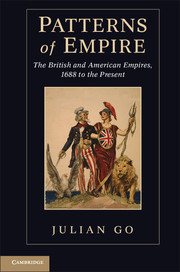Book contents
- Frontmatter
- Contents
- Preface and Acknowledgments
- List of Tables
- List of Figures
- Introduction
- 1 Imperial Paths to Power, 1688–1939
- 2 Colonial Rules
- 3 Hegemonies and Empires
- 4 Imperial Forms, Global Fields
- 5 Weary Titans
- 6 The Dynamics of Imperialism
- 7 Conclusion
- Appendix Notes on Data
- Archives and Abbreviations
- References
- Index
2 - Colonial Rules
Published online by Cambridge University Press: 05 June 2012
- Frontmatter
- Contents
- Preface and Acknowledgments
- List of Tables
- List of Figures
- Introduction
- 1 Imperial Paths to Power, 1688–1939
- 2 Colonial Rules
- 3 Hegemonies and Empires
- 4 Imperial Forms, Global Fields
- 5 Weary Titans
- 6 The Dynamics of Imperialism
- 7 Conclusion
- Appendix Notes on Data
- Archives and Abbreviations
- References
- Index
Summary
In no other Oriental country, whether ruled by Asiatics or by Europeans, is there anything approaching the amount of individual liberty or self-government which our rule has brought to the Philippines.
– U.S. President Theodore Roosevelt (1902)The truth is that the Americans are learning in the Philippines some of the things with which England has become familiar in India and in Egypt.
– Editorial in the Times of London (1910)The United States empire up to World War II does not easily fit the frame forged by traditional exceptionalist thought. Contrary to exceptionalism's portrayals, America's westward expansion entailed imperialism, and its overseas expansion resulted in a formal empire stretching from Puerto Rico and the Virgin Islands to the Philippines and Samoa. We have seen how, even in terms of size and bureaucracy, this empire was not fundamentally different from Britain's empire during the latter's comparable phase of development. The Council on Foreign Relations in the 1920s noted this similarity:
Like Great Britain, we have reached the point of rapid city growth and a relatively diminishing agricultural population. In colonial possessions, in the relations of an advanced country to countries less “civilized” or backward, in the export of capital for foreign investment and in the competition for raw materials and foreign markets, we have moved toward the English situation. While our problems may be different in detail, they involve us in the study and settlement of questions often similar to those of Great Britain. Panama has many resemblances to Suez, and our relation to Panama is in many respects analogous to that of Great Britain to Egypt. It was constantly on the tongues of the Englishmen at the Peace Conference that many of our new problems in the Philippines resembled their own in Egypt and the Far East. The wide geographical distribution of our territorial problems –…the Philippines, Alaska to Panama – puts us at last in the same general position that Great Britain has long occupied; that is, we impinge upon most of the major problems of the world.
- Type
- Chapter
- Information
- Patterns of EmpireThe British and American Empires, 1688 to the Present, pp. 67 - 102Publisher: Cambridge University PressPrint publication year: 2011

